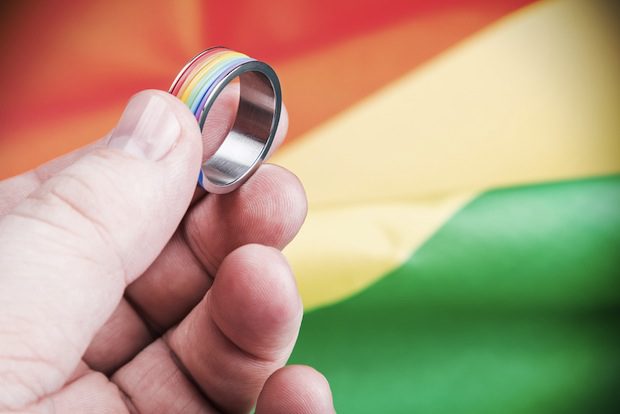The Ironic Truth About Marriage

But in one of the ironies in which the arc of history specializes, while the conservative case for same-sex marriage triumphed in politics, the liberationist case against marriage’s centrality to human flourishing was winning in the wider culture.
You would not know this from Kennedy’s opinion, which is relentlessly upbeat about how “new insights have strengthened, not weakened” marriage, bringing “new dimensions of freedom” to society.
But the central “new dimension of freedom” being claimed by straight America is a freedom from marriage — from the institution as traditionally understood, and from wedlock and family, period.
Our culture accepted same-sex marriage, Douthat points out, at the same time that it was turning away marriage itself, at least as it has been traditionally understood. More:
Since the ’90s, approval of divorce, premarital sex, and out-of-wedlock childbearing have climbed steadily, and the belief that children are “very important” to marriage has collapsed. Kennedy’s ruling argues that the right to marry is essential, in part, because the institution “safeguards children and families.” But the changing cultural attitudes that justify his jurisprudence increasingly treat this safeguard as inessential, a potentially nice but hardly necessary thing.
And the same is true of marriage itself. America is not quite so “advanced” as certain European societies, but our marriage rate is at historic lows, with the millennial generation, the vanguard of support for same-sex marriage,leading the retreat. Millennials may agree with Kennedy’s ruling, but they’re making his view of marriage as “a keystone of the nation’s social order” look antique. In their views and (lack of) vows, they’re taking a more relaxed perspective, in which wedlock is malleable and optional, one way among many to love, live, rear kids — or not.
In this sense, the gay rights movement has won twice over. Its conservative wing won the right to normalcy for gay couples, while rapid cultural change has made the definition of normalcy less binding than the gay left once feared.
If Douthat is right, then straights wanted a version of marriage that gave them maximum flexibility for Choice™ — and that form of marriage naturally included same-sex couples. If marriage is nothing more than an expressive phenomenon, then why not? More Douthat:
The case for same-sex marriage has been pressed in the name of the Future. But the vision of marriage and family that made its victory possible is deeply present-oriented, rejecting not only lessons of a long human past but also many of the moral claims that inspire adults to privilege the interests of their children, or indeed to bring children into existence at all.
This is the future the Supreme Court has given us, and the future that young America clearly has chosen. I recall this morning something a college professor said to me in the past year or two: “I worry about whether these kids will ever be able to form stable attachments in marriage. They have seen so few models in their own lives.”
The task of imparting a strong culture of marriage to future generations grows ever more difficult. This is not going to end well for us. As Douthat indicates, this is not the fault of gays, but rather the causation runs the other way — and in a direction that renders Justice Kennedy’s (widely accepted) narrative far less credible. Again, though, this is the narrative that we’ve chosen to tell ourselves. From the chief justice’s dissent:
As a result, the Court invalidates the marriage laws of more than half the States and orders the transformation of a social institution that has formed the basis of human society for millennia, for the Kalahari Bushmen and the Han Chinese, the Carthaginians and the Aztecs. Just who do we think we are?
… The majority’s understanding of due process lays out a tantalizing vision of the future for Members of this Court: If an unvarying social institution enduring over all of recorded history cannot inhibit judicial policymaking, what can? But this approach is dangerous for the rule of law. The purpose of insisting that implied fundamental rights have roots in the history and tradition of our people is to ensure that when unelected judges strike down democratically enacted laws, they do so based on something more than their own beliefs. The Court today not only overlooks our country’s entire history and tradition but actively repudiates it, preferring to live only in the heady days of the here and now.
America in 2015 has the Supreme Court it wants. And deserves.
Subscribe for as little as $5/mo to start commenting on Rod’s blog.